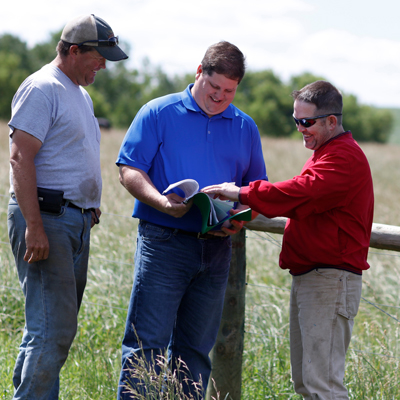Cracking the Code: How to Appraise Farmland
In the world of agriculture, buying and selling land are familiar routines for many. But here’s a twist: Farm real estate appraisals don’t quite fit the mold of your standard property assessments. Let’s break down the appraisal requirements specific to farmland.
What is a Farm Real Estate Appraisal?
Farm real estate or land appraisal services involve the analysis of a parcel or tract of land to determine its fair market value. Lenders, like Compeer Financial, require appraisals to ensure that the loan’s collateral meets their requirements and fulfills regulatory requirements.
An appraiser’s goal is to match the intricacy and risk associated with the loan to the appropriate type of appraisal. In many instances, vacant land can use a condensed, cheaper report called a "restricted appraisal." This speeds up the process too. On the other hand, farms with lots of buildings or unique features need more analysis and review. These appraisals involve a visit from the appraiser and the report takes more time to finish.

Regardless of the report format, the essence of a farm real estate appraisal is to pinpoint the most optimal use for the land and compare it with similar properties sold under arm’s-length transactions. The appraiser takes into account factors like the land’s size and location. Moreover, when assessing agricultural land, aspects like soil quality, drainage, and operational utility play pivotal roles in influencing the property’s value and income potential.
Appraisal Techniques
Whether it's an appraisal for a residence or a farm real estate appraisal, a state-licensed appraiser will develop a report. Three techniques are used to value agricultural property:
- Sales Comparison: In this method, the appraiser studies comparable properties in the local market that have recently changed hands and compares them with the subject property being appraised.
- Income Approach: This technique revolves around estimating the property's income potential, particularly the net income. It’s primarily used for income-producing properties like farmland.
- Cost Approach: The cost approach gauges the value by considering the individual components of the property, a path often taken when the property features building improvements.
Farm Real Estate Appraisal Requirements
New loans are a common trigger for requiring an appraisal. But they aren’t the only time you might need one. Real estate appraisals are essential in various other scenarios, including:
- Lending or loan documentation
- Estate planning, settlement, or inheritance tax valuation
- Divorce settlements
- Sale and purchases
- Legal disputes
- Charitable contributions
- Condemnation cases
- Property division
- Investment analysis
- Special use valuation
- Upgrades and improvements, like livestock facilities or field tiles
What You'll Need
If you require an appraisal, you’ll need to provide your appraisal service team with the following information:
- Assessor’s Parcel Number(s) (APN)
- Address (if applicable)
- Legal description
- Map
What You Receive
Whether you’re seeking a new loan or an appraisal for any other purpose, a valuation team offers you:
- Consistent research, verification, and analysis of comparable sales
- In-depth knowledge of agriculture and rural America
- Extensive geographic coverage
Upon completion of the appraisal, you’ll receive a report containing evidence that supports the appraiser’s market value opinion and outlines the methodology used. The appraisal report is tailored to meet the specific needs of the client, guided by the scope of work.
Land values and economic indicators are in a constant state of flux, which can add stress when dealing with farm real estate. Collaborating with an appraiser well-versed in agricultural appraisal and possessing extensive experience in the field can ease the burden for property owners like you.
Stay Ahead of the Curve
Sign up for our FREE Appraisal Insights Newsletter to get timely data & analysis in today's rapidly changing agricultural economy.
This article was originally printed in the Winter 2023 edition of Compeer Financial's Cultivate magazine.